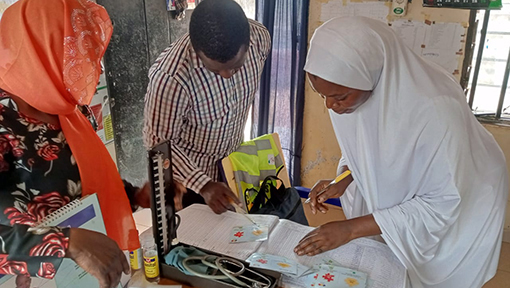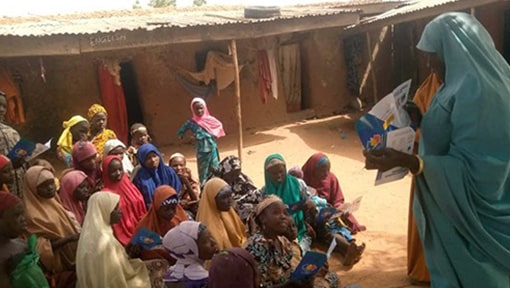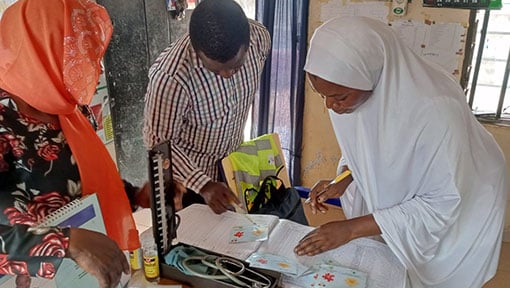Prayagraj Master Coach Helps Institute Monthly Meetings, Regular Data Review to Sustain TCI’s Impact
Contributors: Vivek Malviya, Samarendra Behera, Hitesh Sahni, Emily Das, Deepti Mathur and Parul Saxena
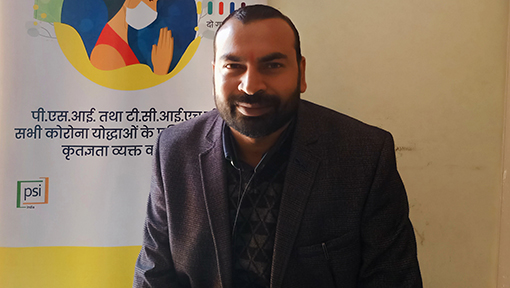
TCI master coach Ravi Maurya is the Divisional Urban Health Consultant of the NUHM in Prayagraj.
The Challenge Initiative (TCI) promotes local ownership and sustainability by empowering and strengthening the capacity of coaches within local health systems to ensure long-term implementation and ultimately the impact of evidence-based family planning interventions. After a little over four years of engagement with TCI, Prayagraj, a city in Uttar Pradesh (UP), India, graduated from TCI India’s direct technical support in April 2022.
Ravi Maurya is the Divisional Urban Health Consultant of Prayagraj, working for the National Urban Health Mission (NUHM). He was identified by the city’s Chief Medical Officer (CMO) to serve as a Master Coach mentoring urban stakeholders in the health system to continue implementing TCI approaches after graduation. Ravi shared how he along with other Master Coaches put systems in place, such as monthly master coach meetings and the regular review of data, to ensure the continued strategic implementation of the family planning interventions.
Master coach meetings are held monthly in Prayagraj, where all master coaches collectively discuss, review, and plan to improve the city’s family planning indicators. This procedure includes – determining the date of the meeting by CMO and informing all the coaches via letter and WhatsApp group of master coaches. Some of the common agenda items include reviewing urban family planning HMIS data, identifying action areas based on the last round of Reflection in Action to Improve Self-Reliance and Effectiveness (RAISE) assessment, reviewing action points from the previous master coach meeting, discussing new requirements and determining the next course of action.
For example, before initiating the whole-site orientation (WSO) of higher order facilities, we planned to develop the Chief Medical Superintendent (CMS) of District Women’s Hospital as a ‘WSO master trainer’, so that they can orient their clinical and non-clinical staff on creating an enabling environment for postpartum and post-abortion family planning and also provide on-site coaching support as needed. These master coach meetings have helped in becoming more strategic, having given cadence to taking the action plans forward.”
Noteworthy Decisions Taken in the Master Coach Meetings
- Conducting accredited social health activists (ASHAs) and auxiliary nurse midwives (ANMs) monthly meetings in the last week of each month assisted medical officers-in-charge (MOICs) in ensuring the completeness of urban health index register (UHIR) data and reviewing 2BY2 matrix data. MOICs coach ASHAs in prioritizing clients and developing a visit plan for the following month during these meetings.
- Under the leadership of the MOIC, the urban primary health center (UPHC) level monthly data validation committee meets on the 26th and 30th of each month to validate and verify monthly family planning data before uploading to HMIS.
- The UPHC monthly quality improvement meeting is held on the first or second week of each month. MOICs and the quality improvement (QI) team meet to discuss quality issues, identify gaps and develop an action plan.
These changes along with the implementation of the evidence-based interventions has led to a significant increase in annual client volume in Prayagraj at the UPHC and city levels.
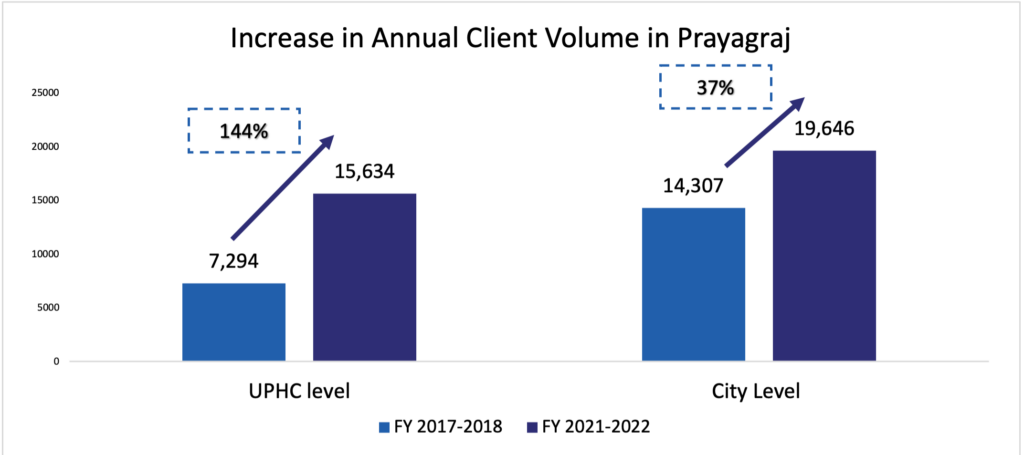
The direct support of TCI India in Prayagraj began in fiscal year 2017-2018 and continued until fiscal year 2021–2022. (Source: HMIS)
Ravi noted how his master coach skills have also extended to the TCI diffusion city of Fatehpur, where he helped identify and address critical human resource gaps.
We learnt that 12 ASHAs were mistakenly reporting to ANMs of other UPHCs, and also UPHC staff were not skilled in providing long-acting reversible contraceptives (LARC) services, and also the IUCD kits were missing. These gaps helped us to plan and address these issues.”
Ravi has since coached Fatehpur NUHM officials on several evidence-based interventions.
Based on my coaching support, the city started implementing fixed-day static services/Antral diwas in UPHCs on the spacing methods, formed a city coordination committee (CCC), and began holding CCC meetings. As a result, there was 72% increase in IUCD data in Fatehpur over two fiscal years (April 2020 to March 2021 to April 2021 to March 2022). ”

